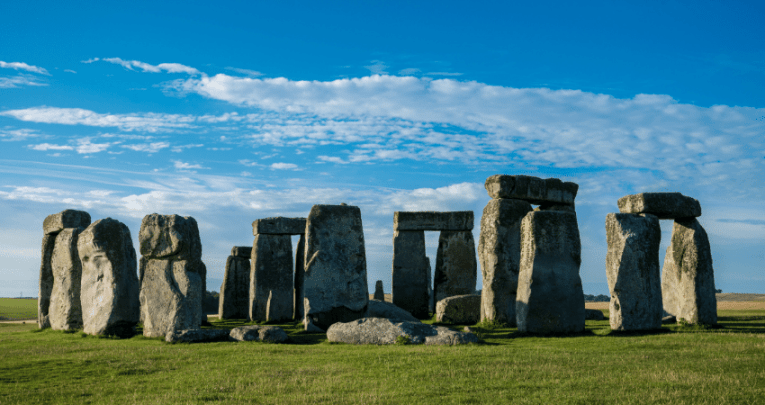History school trips – Help pupils develop a greater understanding of chronology

Use a history school trip to explain to pupils how historical events link together

- by Helen Kerry
- Education visits officer at English Heritage Visit website
Whether taught at school, presented on a TV documentary or noted in a history book, most of us are aware of history’s key moments and we know who the main protagonists are. You know, “1066 and all that”.
Understanding how life was different thousands of years ago can be relatively easy for our students to grasp – handling objects at Stonehenge to get under the skin of Neolithic life, for example, can help transport students back.
Finding continuity, or things that are directly relatable, however, can be more challenging for them.
Bring learning history to life
Appreciating how events link together throughout history, and then considering our place within it, is beneficial from both an academic and wellbeing perspective.
“If we can find these links,” says Katie Thoburn, learning manager at English Heritage, “it brings learning history to life. And this is where educational school trips can have a real impact. They help make the past much more relatable, tangible and assist school children in developing a much deeper understanding of period and chronology.”
Why history school trips are hugely beneficial
There’s nothing quite like standing in the places where history happened. Spending time in places where people lived, breathed, worked and fought can be hugely beneficial for students in understanding key moments in history in a way that transcends text books.
Pupils have a chance to interact with each other and their teachers in a new way, sparking conversation and debate.
Bea Honap-Baker, teacher of history and politics, sums it up, saying: “Students ask probing questions, get excited about learning new facts, and they enjoy learning about different perspectives about the past.”
Understanding our place within history, too, can be massively beneficial for our wellbeing.
Historic England has reported how heritage can help “improve personal wellbeing, by helping us understand our past, our individual and communal identity and help us connect with the places where we live.”
Bea adds, “Importantly for us, it has allowed us to really connect with local history and has given us so many chances to develop our students’ cultural capital.”
Providing experiences via a school history trip
History school trips also widen a student’s horizons, reinforce their cultural rights and their right to participate in the culture of their community.
Providing these experiences means they feel confident visiting as an adult – they feel welcome and like they belong in these settings.
Passing of time
It might be that you want to use a visit to a site to go into detail on a particular moment in time, like Neolithic life at Stonehenge, or you may want to use an educational trip to help students understand progress throughout history and the passing of time, as you can at sites such as Dover and Portchester.
Either way, there are a wealth of historical sites throughout the country that can address both of these challenges.
While some heritage sites offer expert-led tours at a small cost, there are also opportunities for you to organise your own free, self-led visit at many locations.
The prospect of organising one of these may bring you out in some sort of stress-induced rash, with risk assessments, permission slips and coach travel admin to arrange.
However, venues are generally more than happy to help with your planning and can point you in the direction of what you need to know. Once you’re out of the classroom, it’s well worth the effort.
Explore the breadth and depth of the curriculum
Taking the opportunity to get out of the classroom is enormously helpful for both you and your students, giving you the chance to explore both breadth and depth elements of the history curriculum.
It also allows both you and your class to approach a topic from a new perspective.
A school visit is often the first and only time a child will visit a heritage site, even if it’s to a very local place. Their excitement and joy at being out of the classroom visiting somewhere different is infectious.
Self-lead a school tour like an expert
As well as being low cost, leading an historical school trip yourself means you can choose to explore the topics, or even elements of topics, that are of particular interest to your class.
History school trips can be tailor-made according to your group’s needs and you can spend as much or as little time as you need on the site.
Narrow your focus. When browsing school trip ideas, consider the topic you want to cover and how a visit to the site will benefit your students and their understanding of it. What parts do you want to go to and what can you do there?
Do a pre-visit. If you can, take up the opportunity to go on a free planning visit ahead of history school trips. This way you can get all the logistical worries out of the way, as well as being inspired before the main event by the wide range of opportunities available at your venue.
Ask about resources. There are often free resources or handling collections available for schools to use – just make sure you book them in advance. At English Heritage we provide these at many of our sites and they always go down really well.
Sort out logistics. Venues can often help with risk assessments and hazard information, taking the hassle out of planning your day. Before you go, find out who your point of contact is for the day, where the toilets are, where you can have lunch and where you can store your bags and coats.
Get back-up. Find out if there will be any staff or volunteers around to help on the day who can provide additional information or insight during your trip.
Helen Kerry is education visits officer at English Heritage.






